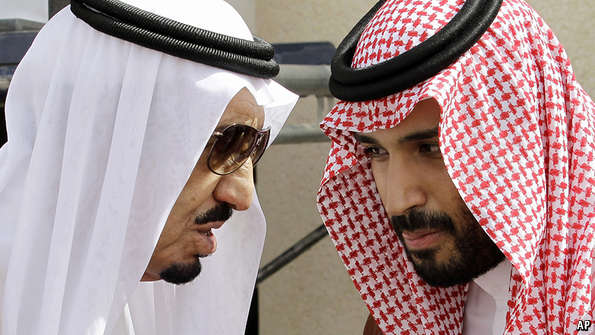Geopolitics in the Gulf
by Leila Mohamed and Biodun Iginla, The Economist Intelligence Unit and BBC News Political Analysts, London/Qatar
Chaos in the Middle East casts Saudi Arabia as the Arab world’s leader. But it must reform faster

Arabs badly need modern, dynamic leaders. But much of what the new Saudi rulers are doing looks like a rash gamble rather than an attempt to deal with the real problems of their country, let alone the region. If Saudi leadership is to work well, then it needs to take a different form.
Advertisement
Why the sheikhs are stirring
As the custodian of Islam’s two holiest places and, until
recently, the world’s largest oil producer, Saudi Arabia is bound to
occupy an important place in the Arab and Islamic worlds. But today’s
unusual times have led to a burst of unusual activism. When oil prices
fell, Saudi Arabia no longer sacrificed its output to stabilise the
market; instead it kept pumping oil to drive out rivals. When Islamists
were elected to power in Egypt after a popular revolt, Saudi Arabia and
other Gulf states backed the army coup that toppled the president,
Muhammad Morsi; they have bankrolled the generals ever since. And when
Iranian-backed Houthi rebels threatened to take over Yemen this year,
Saudi Arabia went to war.At home, King Salman (pictured left) is overseeing a constitutional revolution. Instead of passing the crown along the line of gerontocratic sons of Abdel Aziz bin Saud, the dynasty’s founder, he is favouring a new generation—above all, his own son (see article). Aged about 30, Muhammad (pictured right) has become the central economic policymaker; as defence minister, he embodies the sword of the Saudi flag.
This amounts to radical change from the retiring, conservative, consensus-building habits of the past. But then Saudi Arabia is grappling with three new factors. All around, Arab states have collapsed or faded away. Iraq, once the Arab bulwark against Iran, is devastated, as is Syria. Egypt, the most populous Arab country, is busy consolidating its counter-revolution. That leaves Saudi Arabia as the only state with the standing, size and wealth to salvage something from the wreckage.
A second factor is geopolitical realignment: the American protector wants to retreat from the chaos, and the Iranian arch-enemy is surging forward. By negotiating a nuclear deal with Iran, America has deepened Arab monarchs’ fear of abandonment. They think they must fend for themselves.
The third factor is the new economics of shale: America has displaced Saudi Arabia as the world’s biggest oil producer. As the price falls, Saudi Arabia is fighting to retain its share of the market and put higher-cost producers out of business.
The trouble is that the plan is not working. The war in Yemen, though popular at home, is going badly. After weeks of bombing, the Houthis are still advancing. A naval blockade has led to a humanitarian crisis that is causing outrage.
The war, and the rush to buy Western weapons, are burning a hole in the public finances. Saudi Arabia is running a double-digit budget deficit at a time when the oil price shows little prospect of further recovery. Although the princes are changing the pecking order in their palaces, they are not giving the people any more of a voice. On the contrary, Bedouin-style consultation has yielded to top-down direction. They have done nothing to revise their unholy pact with Wahhabi clerics, whose puritanism helps underpin jihadist ideology—indeed, public beheadings are more frequent.
The old Saudi model, in which the people ask no questions of their munificent, American-protected rulers, is reaching a dead end. The kingdom can no longer keep handing out do-nothing government jobs to its men; its women are increasingly educated but woefully underemployed because of outdated social restrictions. Finding alternative livelihoods requires an economy that is open to the outside world and a population educated to do more than read the Koran. Look around: Riyadh is drab, while across the border Dubai is glistening.
Saudi Arabia needs to diversify away from oil. Citizens should be taxed rather than subsidised. That would help the public finances, and make for healthier relations between the rulers and the ruled. One way or another, change will force itself on the country. Those in power should use that to bring about reform. That would also be the best way to show leadership, stand up to Iran, resist radicalism—and preserve the fraying alliance with the West.


No comments:
Post a Comment